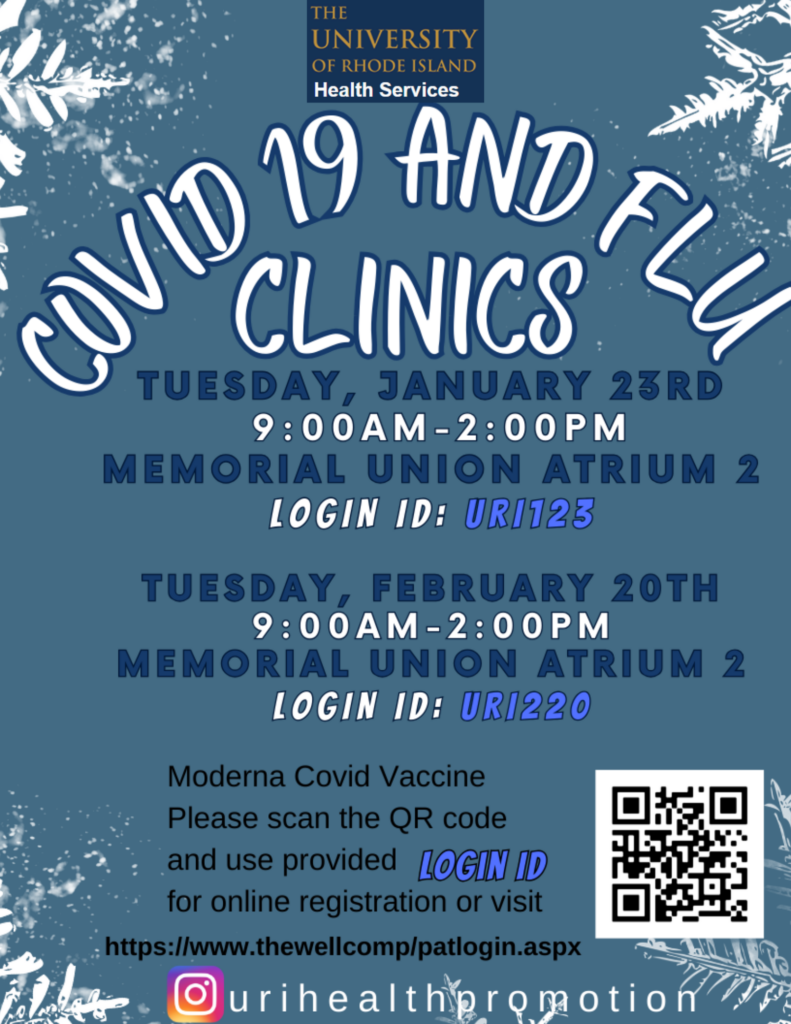KINGSTON, R.I.–Jan. 19, 2024–Cold and flu season continues and according to the Centers for Disease Control and Prevention, the numbers for COVID-19 and seasonal flu have been up in most parts of the country in recent weeks. The United States is in the midst of what some are calling a “tripledemic” with seasonal flu, RSV (respiratory syncytial virus) and COVID-19 all making the rounds.
The symptoms for each are similar: coughing, sneezing, runny nose, congestion–perhaps accompanied by head or body aches and fever. Left untreated, these illnesses can lead to ear and sinus infections, bronchitis and pneumonia, and longer term complications, or worse.
One of the best ways to protect yourself from getting sick–or to keep a mild illness from becoming more serious–is to get vaccinated. That’s why on Tuesday, Jan. 23, from 9 a.m. to 2 p.m., URI Health Services will host a free COVID-19 and flu vaccine clinic in the Memorial Union, Atrium 2. Advance registration is required: Use LOGIN ID URI123. If you are unable to make it, a second clinic will be held Feb. 20 from 9 a.m. to 2 p.m. in Memorial Union, Atrium 2. (Use LOGIN ID URI220 to register.)
“What we are seeing right now is really pretty typical for this time of year–but if we’ve learned anything in the past several years it is how easily germs and viruses can spread and why it is so important to protect yourself in order to avoid getting sick,” said Dr. Chris Nasin, medical director of URI Health Services.
Below Dr. Nasin answers a few questions on how to protect yourself and stay healthy this semester and when to seek care if you aren’t feeling well.
Why does it seem like so many people are sick right now?
What we are seeing are seasonal patterns of illness that are typical for this time of year. Fall and winter are generally considered cold and flu season. Flu season reaches its peak in February and usually tapers off by March. Respiratory viruses are also more prevalent during this time of year and so is illness caused by these viral pathogens.
Is this year worse than previous years?
While the level of flu-like illness is currently considered high here in Rhode Island, so far what we are seeing this year really mirrors what we have seen in previous years.
But, if we have learned anything in the past several years, it is how easily germs and viruses can spread and why it is so important to protect yourself in order to avoid getting sick or spreading that illness to a loved one – and how easy it is to do that.
How can people stay healthy this cold and flu season?
One of the easiest things that you can do is to get vaccinated against flu and COVID-19. URI Health Services will be hosting a free vaccination clinic on Tuesday, Jan. 23, in the Memorial Union and a second clinic on Tuesday, Feb. 20. All you need to do is register.
To help stop the spread of germs, cover your mouth and nose when you cough or sneeze. And remember to always wash your hands.
It’s also important to remember to be a good citizen. If you are sick, stay home and recover. If you have COVID, you should isolate for five days in compliance with the Rhode Island Department of Health’s recommendations.
If you aren’t feeling well, should you tough it out? When should you seek care?
If you have flu-like symptoms (fever plus a cough or fever plus a sore throat), stay home from work, school, or child care until you have been fever-free (temperature less than 100.4 degrees Fahrenheit, or 38 degrees Celsius) for 24 hours without the use of fever-reducing medications.
Make sure to rest and drink plenty of fluids and consider using over-the-counter medicines such as Tylenol, ibuprofen or aspirin to relieve symptoms. (If you are under 19, do not use aspirin to treat the flu.) You should also avoid using alcohol, caffeine or tobacco. If you are in a higher risk category of developing flu-related complications, such as if you are pregnant or have an underlying health condition, you should check with your primary care provider about any special care you might need.
Most people with the flu are sick three to five days and get better on their own. If your symptoms persist or get worse, you should consult with your primary care provider, urgent care facility or URI Health Services. If you have difficulty breathing or shortness of breath, pain or pressure in the chest, or are experiencing flu-like symptoms that improve but then return with fever and worse cough, you should go the emergency room. If you aren’t sure if you need to go to the emergency room, you should contact your primary care provider or URI Health Services.
URI Health Services is open from 8 a.m. to 8 p.m. during the week and 10 a.m. to 4 p.m. on the weekend. To schedule an appointment, contact 401.874.2246.


